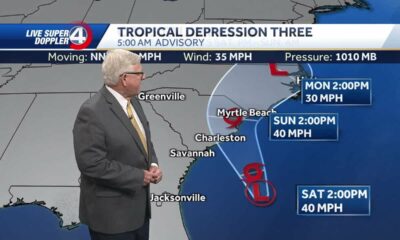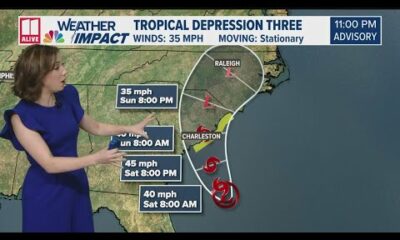News from the South - Georgia News Feed
MAP: Emergency room visits for respiratory illnesses are soaring in these states
SUMMARY: As the New Year begins, many states are experiencing a surge in hospital visits due to respiratory illnesses, with emergency department visits for influenza and RSV reaching “very high” levels according to the CDC. The states most affected include Arizona, Texas, and Florida. Pediatric hospitals have been especially busy since November, as RSV cases rise alongside influenza infections. Symptoms for RSV, flu, and COVID-19 overlap, making diagnosis challenging. Health officials recommend annual flu vaccinations and good hygiene practices to protect against these illnesses. Additionally, the CDC is monitoring outbreaks of norovirus and sporadic cases of bird flu, though the public risk remains low.
The post MAP: Emergency room visits for respiratory illnesses are soaring in these states appeared first on www.wsav.com
News from the South - Georgia News Feed
'Today will be a hard day': Search ongoing for missing kids, adults in Kerrville
SUMMARY: Following the deadly flash flooding in Kerrville and Kerr County on July 4, officials reported 27 fatalities, including 18 adults and nine children, with some still unidentified. Hundreds of rescue workers continue search operations, focusing on unaccounted-for individuals, including about 20 children missing from a camp. Water levels began receding by Saturday morning, revealing extensive debris and damage, including homes washed away. A relief fund was established by the Community Foundation of Texas Hill Country. Governor Greg Abbott will give an update Saturday afternoon alongside federal and state officials. Authorities emphasized ongoing search efforts and community support amid a tragic recovery.
The post 'Today will be a hard day': Search ongoing for missing kids, adults in Kerrville appeared first on www.wjbf.com
News from the South - Georgia News Feed
Tropical Depression Three 11pm track, models | When could it become 'Chantal'?
SUMMARY: Tropical Depression Three formed today, stalled about 150 miles south of Charleston, and appears ragged. It’s currently stationary but expected to move northward by tomorrow. Models suggest it could strengthen into a low-end tropical storm named Chantal early tomorrow. Landfall is predicted late Saturday night or early Sunday morning near the Carolinas, where it will quickly dissipate after losing Atlantic’s warm waters. Tropical storm watches are in place, likely upgrading to warnings. Most storm activity, including heavy rain and thunderstorms, will impact South and North Carolina, with minimal effects on Georgia except for increased rip currents and a slight chance of showers Sunday. Heat will persist statewide.
This is forecast to become TS Chantal.
News from the South - Georgia News Feed
WJBF Hometown Hot Dog Eating Contest 2025
SUMMARY: On Independence Day, over 150 million hot dogs will be enjoyed, spotlighting the iconic American food, especially in competitive eating. The annual Your Hometown Amateur Hot Dog Eating Contest at SRP Park showcases six contenders from the local community, including broadcasters and athletes, vying to devour the most hot dogs. Rooted in German sausage traditions, the hot dog became a staple in America by the 1860s, gaining fame with Nathan’s Famous competitions since 1972. Returning champion Mike O’Neal faces fierce rivalry from last year’s runner-up Brandon Dawson, among others, in a spirited battle of speed, stamina, and willpower, blending tradition with festive competition.
The post WJBF Hometown Hot Dog Eating Contest 2025 appeared first on www.wjbf.com
-

 The Center Square6 days ago
The Center Square6 days agoU.S. Senate prepares for passage of One Big Beautiful Bill Act | National
-

 News from the South - Louisiana News Feed6 days ago
News from the South - Louisiana News Feed6 days agoWater company hiked sewage rates in Lafayette to state’s highest
-

 News from the South - Tennessee News Feed6 days ago
News from the South - Tennessee News Feed6 days ago“Choose how you love:” Nashville Pride 2025
-

 News from the South - Virginia News Feed7 days ago
News from the South - Virginia News Feed7 days agoSenate Republicans work through the weekend to pass Trump’s One Big Beautiful Bill
-

 Mississippi Today5 days ago
Mississippi Today5 days agoFeds unfreeze $137 million in Mississippi education money
-

 News from the South - Arkansas News Feed6 days ago
News from the South - Arkansas News Feed6 days agoThousands celebrate pride, progress at the 2025 NWA Pride Parade
-

 News from the South - Arkansas News Feed6 days ago
News from the South - Arkansas News Feed6 days agoCongress unlikely to enact ‘absolutely devastating’ Trump proposal to slash Pell Grants
-

 Local News6 days ago
Local News6 days agoMississippi airports working to complete projects

























